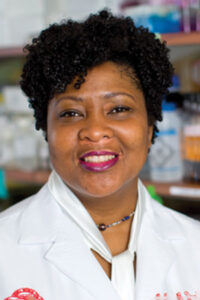Panelists discuss African ancestry associations with clinical outcomes in cancer
//
Estimated Read Time:
The session Pan-cancer Distinctions in Tumor Biology across Ethnicity and Genetic Ancestry featured a panel of investigators who discussed emerging basic science evidence of biologically distinct tumor phenotypes among race/ancestry groups and highlighted their newest findings related to African-American disparities.
Distinctions in breast and gyn-onc cancers in Afro-Caribbean women

Sophia H. l. George, PhD, University of Miami Sylvester Comprehensive Cancer Center, discussed findings from a prospective multinational study in seven Caribbean countries looking at the BRCA genes across Caribbean ancestry groups.
“We enrolled 1,018 breast and ovarian cancer patients for the study,” George said. “Of them, we identified pathogenic mutations in 144 individuals, predominantly across three genes — BRCA1, BRCA2, and PALB2.”
Researchers also observed that women from different countries had different rates and types of breast cancer pathologies. In the Bahamas, for example, George said the majority of the women had triple negative breast cancer. In Haiti, there was a large percentage of women with HER2 breast cancer.
“The results of our study suggest that in people of Caribbean descent diagnosed with breast or ovarian cancer, one in seven will have a pathogenic gene mutation,” she said. “With this information, targeted therapies and prevention approaches can be used to improve outcomes.”
Emerging genomic biomarkers for improving lung and kidney cancer health disparities in African Americans

Khadijah A. Mitchell, PhD, MS, Lafayette College, discussed emerging insight on African American male lung cancer with respect to PDE-4D overexpression and inhibitors for precise lung cancer treatment in this population, as well some opportunities for more precise prognostic models in kidney cancer among patients with high West African ancestry.
“A previous study in African Americans found an association between a genetic variant in the PDE4D gene and lung cancer in African American men, but not women,” Mitchell said. “This led us to profile PDE4D expression in African American men and women using mRNA sequencing data, and we saw that African American men had significantly higher expression of this gene.”
Additionally, she reported that African American men had significantly more West African ancestry in cases when compared with unaffected controls.
“African American male lung cancer patients with PDE4D overexpression may be good candidates for PDE4 inhibitors,” Mitchell said. “Further studies are needed to pursue the mechanistic links between ancestry and the PDE4D function.”
With regard to kidney cancer, she said that ancestry-specific gene amplifications may improve clinical risk prediction and make prognostic models more precise for kidney cancer patients with high West African ancestry.
African ancestry and tumor immune responses in reproductive cancers

Melissa B. Davis, PhD, Weill Cornell Medical College, discussed ongoing work looking at tumor immune landscapes in breast cancer related to genetic ancestry across the African diaspora.
Using African ancestry to assess tumor-gene networks, the researchers’ work led them to focus on the Duffy antigen receptor for chemokines (DARC) gene, which regulates dynamic inflammatory chemokine levels via vascular endothelial cells and concentrations in plasma.
“The DARC gene is actually expressed, primarily on red blood cells, but also on endothelial cells, and we know that there is an allele called Duffy-null that exists in this gene, and it is primarily across the globe associated with ancestry from Africa,” Davis said. “In a cancer context, what we want to pay attention to is the fact that on red blood cells, DARC is a chemokine sink, but in the area of inflamed tissue, it is also a cytokine pump, creating a gradient that recruits immune cells into the tissue space.”
Studies have shown, she said, that it is the expression of DARC on the endothelial cells that assists the invasion of neutrophils into the tumor space.
“What we start to see unraveling is that the immune landscape is very different across ancestry groups,” Davis said. “While it is important to quantify for genetic ancestry in the context of identifying genetic drivers, we also need to pay attention to self-reported race, as this correlates with the social environment, which could also impact comorbidities on a population level.”
In addition to this On Demand session, the presenters participated in a live Panel Discussion on Tuesday, April 13. Registrants can watch replays through June 21, 2021.


